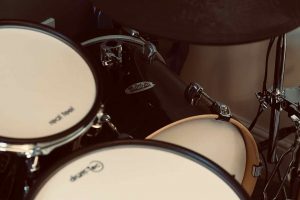Are you thinking about learning the drums, or is one of your children constantly bashing on the pots and pans, and you’re wondering whether drumming is the right instrument for them? Below, we’ll look at why, despite the noise (which can be minimised!), drums are a great option for anyone looking to learn an instrument.
You can learn the drums at any age
Firstly, anyone can learn the drums, it doesn’t matter what age. Many people wonder how long it takes to become a great drummer, but really what it comes down to is consistent practice.
What’s the earliest age a child could learn the drums? You could consider introducing a 3 or 4-year-old to drums, but maybe hold off the lessons, to begin with. The earliest age to consider lessons is around 6 or 7 when they have enough mental focus needed to learn an instrument, but it varies by child. Think about whether your child can do the following:
- Hold drum sticks
- Can count to four
- Have basic rhythmic ability
- Are able to focus on a single activity
- Are willing to commit to learning
Another popular time children start wanting to play the drums is between the ages of 10 and 15 when they get into music or have friends playing other instruments. That was my experience, having got into drumming aged 13/14.
After this, there is no cut-off! All it takes is a willingness to learn and a commitment to practising regularly.
Drums are the backbone of music
Drums are the glue that keeps the music together. Almost all contemporary music has a drum part, spanning almost all genres. Even though electronic styles tend to have programmed or sampled drum parts instead of a human playing on an acoustic kit, there’s always room for a drummer to play along.
That versatility makes drumming such a great skill, you might have the most eclectic music tastes, but you’ll always have something to play along to. That can really help with motivation, as you’ll almost always be able to play along to the music you’re into, as drums are in basically everything!
Drumming is a great way to exercise
There’s a reason why the drummer is always dripping with sweat after the gig – it’s a great workout! Drummers use all four limbs when playing – contrast that to guitarists who only need to rely on their wrists and fingers!
Of course, the fitness benefits of drumming vary by genre, since some genres like heavy metal require more energetic drumming than others such as jazz.
In fact, a 2016 study of heavy metal drummers found a 40-minute drumming session burned on average 387 kilocalories, which is comparable to resistance training, running and rowing.
Drumming helps to relieve stress
Alongside fitness benefits, drumming helps to relieve stress. As with most exercises, drumming releases endorphins, which are responsible for feelings of pleasure while reducing stress and pain.
Sure, playing any instrument can be therapeutic, but drumming adds that exercise element which certainly helps. And if you break it down to a primal level, drummers are literally hitting stuff. I can’t think of a better way to release any amount of excess rage!
Drumming improves your coordination
Drumming may have a benefit that is distinct from other instruments. Researchers in Germany discovered that the coordination required by drummers means that over years of practice, the way the left and right sides of their brains communicate becomes more efficient, improving your coordination.
That makes sense when you consider that drummers are using all their limbs to play! And that can benefit other areas of your life, for example in sports or simply multitasking.
Get started!
Like the idea of playing the drums but don’t have a drum kit, let alone the space for one? The good news is you can in fact get started with learning the drums without a kit. Find out how in my post on how to learn the drums without a drum kit.
If you’re ready to invest in your first drum kit, then you might already be aware that they come in two main types: electronic and acoustic. Read up on whether it’s better to learn on acoustic or electronic drums in our guide.


